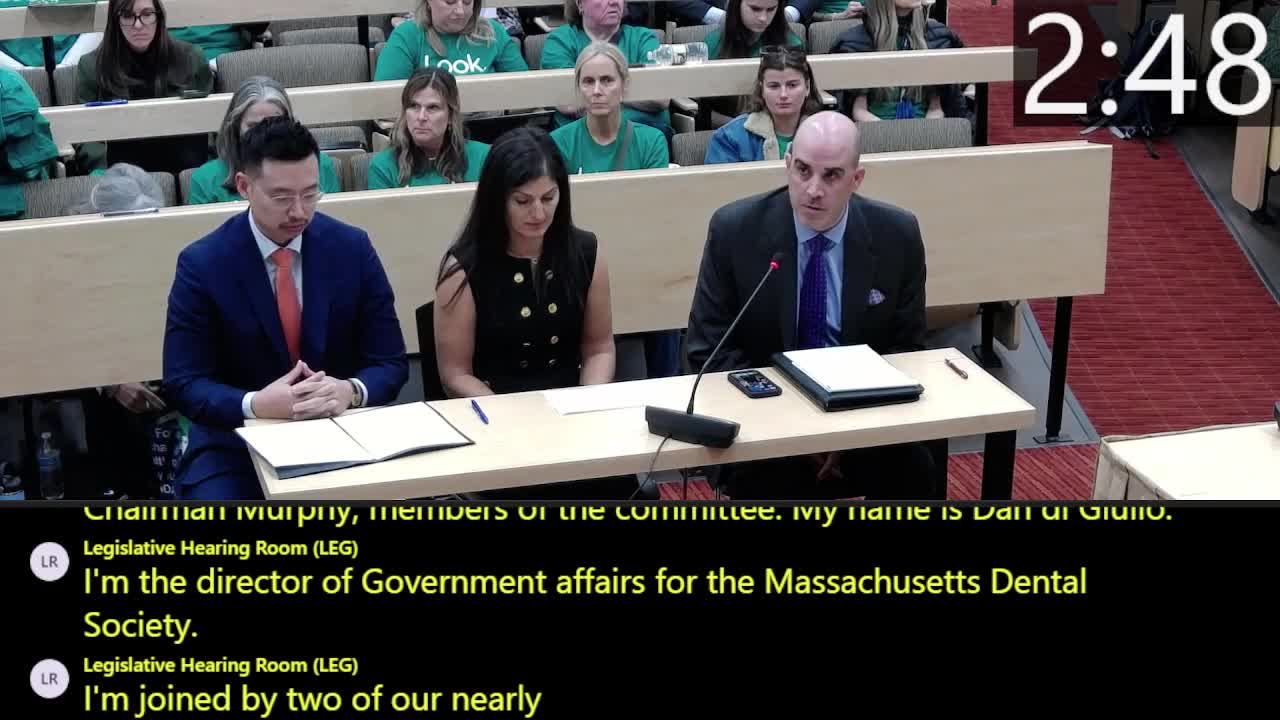Dental‑insurance reforms debated: ballot initiative fixes, network leasing, provider contract protections and public‑health hygienist reimbursement
Get AI-powered insights, summaries, and transcripts
Subscribe
Summary
A broad array of stakeholders presented competing views on multiple dental‑policy bills: technical fixes to Chapter 176X (ballot initiative implementation), network‑leasing transparency, provider contract protections, carve‑outs from Patients First, and reimbursement for public‑health dental hygienists.
Note: the transcript contains detailed, multiplex testimony on several dental bills. Below is a consolidated, neutral summary tying the key points from testimony rather than a verbatim legislative digest.
Stakeholders including the Massachusetts Dental Society, practicing dentists, dental specialists, patient advocates and insurance representatives gave mixed testimony across several related bills. The primary topics raised at the hearing included: (1) technical clarifications to Chapter 176X (the 2022 dental loss‑ratio ballot statute), (2) network‑leasing transparency, (3) contract protections for dentists against one‑sided insurer price mandates, (4) carving dentistry out of certain Patients First requirements, and (5) reimbursement parity for public‑health dental hygienists serving community programs.
Insurer and trade representatives, including Delta Dental and American Association of Health Plans witnesses, supported technical fixes to Chapter 176X to resolve drafting errors and implementation ambiguity (House Bill 12‑62 and Senate Bill 6‑76). AHIP and NADP witnesses said draft language should be clarified to allow the Division of Insurance and carriers operational certainty. Owen Urich (AHIP) and Bianca Beloli (NADP) asked the committee to favor H12‑62/S6‑76 while cautioning against proposals they said would inadvertently reduce network value or create reimbursement guarantees that are impractical.
Dentists and the Massachusetts Dental Society pushed alternative priorities. The Mass Dental Society and many practicing clinicians supported bills to increase contract protections (H12‑92), to require transparency when insurers lease provider contracts to third parties (H13‑06 / S6‑96), and to exclude dentistry from certain Patients First administrative burdens (H12‑91). Dental practices described administrative burdens, unreliable insurer‑provided fee information and fee caps that they say depress reimbursement below the cost of care. Dr. Derek Song and other clinicians said Massachusetts is one of the few states lacking protections that allow dentists to contest one‑sided contract provisions.
Delta Dental’s representative testified in favor of transparency around network leasing, arguing disclosure and consent protect patients and provider viability. At the same time, other industry witnesses warned that some proposed rules (especially those that would convert pretreatment estimates into binding insurer obligations) would create unintended operational and regulatory complexity and could increase administrative costs.
Finally, dental hygienists and public‑health representatives urged the committee to advance H11‑47 / S7‑78 to allow public‑health dental hygienists to bill private insurers in addition to MassHealth. They said the inability to bill private payers is creating persistent unreimbursed program costs that limit school‑ and community‑based preventive services. Witnesses provided local program examples reporting five‑ and six‑figure annual shortfalls when private plans refuse reimbursement for services that MassHealth covers.
The hearing record shows robust stakeholder engagement. The committee did not vote on these bills at the close of testimony.
